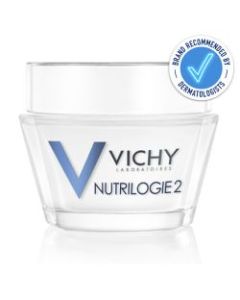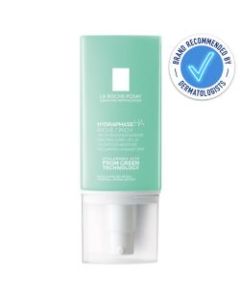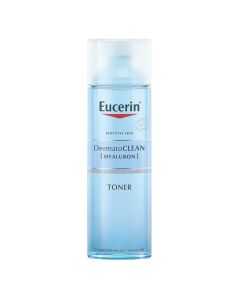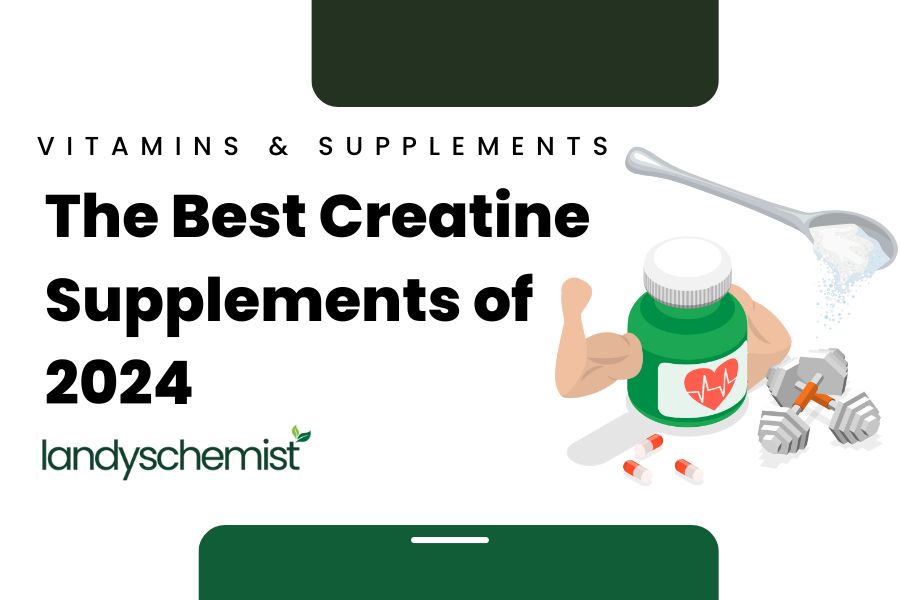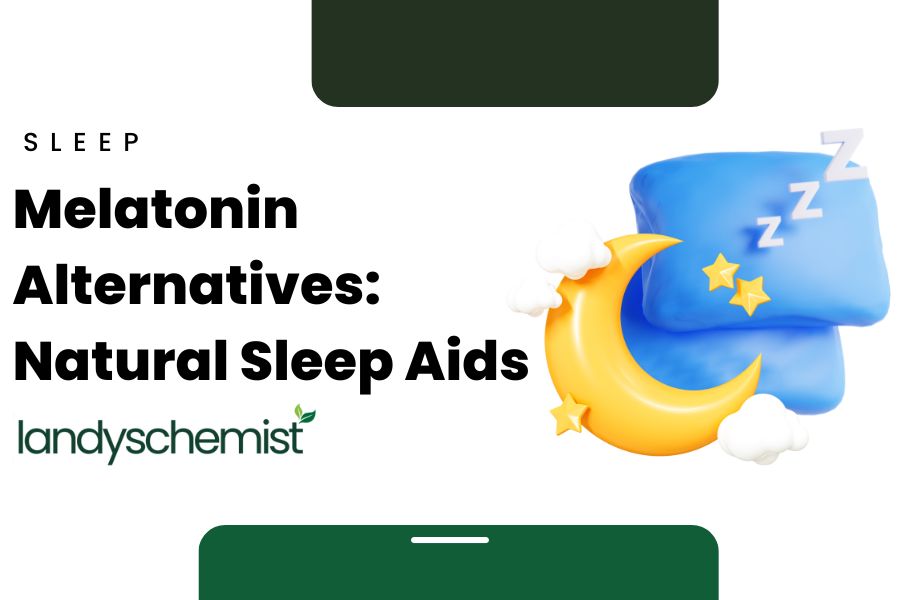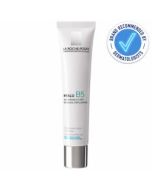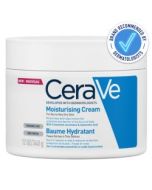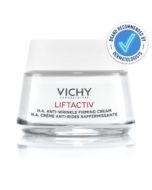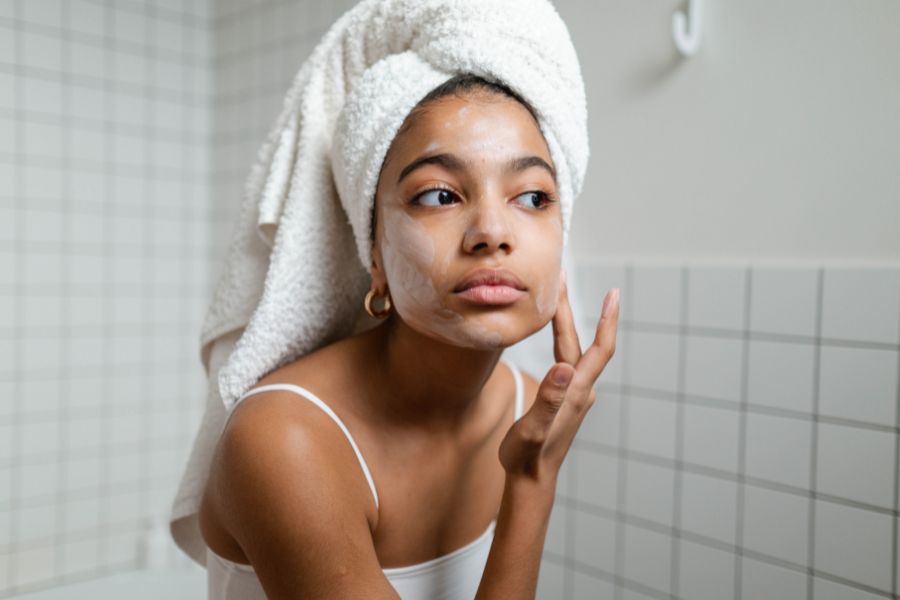
Why is my skin dry even when I moisturise?
Have you ever consistently applied moisturisers to your skin, expecting them to provide much-needed hydration, only to be left disappointed with persistently dry, rough, or itchy skin? If so, you're certainly not alone in this frustrating experience.
In this blog, we dive into the perplexing issue of why your skin may still feel dry despite regular moisturising. By exploring various factors that can contribute to this ongoing dryness, we aim to shed light on the reasons behind the problem. Whether you naturally have dry skin or are currently facing temporary dryness, join us as we uncover the secrets to achieving and maintaining a radiant, well-nourished complexion.
What is Dry Skin?
Dry skin, known as xerosis or xeroderma in medical terms, is a prevalent dermatological condition characterised by insufficient moisture and natural oils in the skin. This lack of hydration leads to an array of uncomfortable symptoms, including skin that is cracked, rough, flaky, and scaly. Moreover, individuals affected by dry skin often endure persistent itching, which further intensifies their discomfort.
What are the causes of Dry Skin?
The development of dry skin can be attributed to various factors, such as environmental elements like low humidity levels, harsh weather conditions, excessive sun exposure, and cold winds. Additionally, using harsh soaps, can contribute to skin dryness. Some specific medical conditions like eczema, psoriasis, or thyroid disorders may exacerbate the problem, making it more challenging to manage.
Addressing dry skin involves adopting proper skincare practices, including the use of gentle, moisturising cleansers, avoiding excessively hot baths or showers, and gently patting the skin dry after washing. Regular application of appropriate moisturisers helps to retain moisture, soothe the skin, and reduce itching.
Dry Skin Symptoms
- Tightness
- Rough texture
- Flaking of the skin
- Scaly skin
- Cracking which can bleed
- Itchy skin
- Wrinkles and fine lines
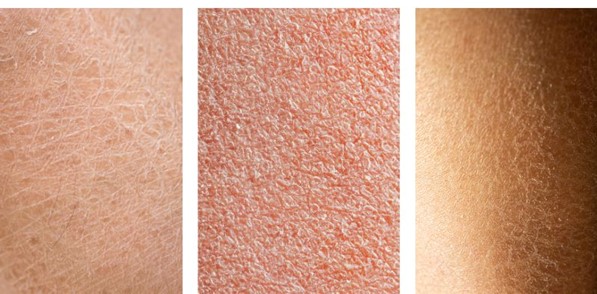
Why is my skin so dry even when I moisturise?
Skincare ingredients drying out the skin
The type of moisturiser you use plays a significant role in the texture and dryness of your skin. If you have dry skin, opting for a suitable moisturiser becomes essential. Consider choosing a thicker moisturiser containing deeply hydrating ingredients like hyaluronic acid, ceramides, and shea butter. These components effectively lock in moisture, increase skin hydration, and prevent moisture loss.
To avoid potential skin irritation, opt for non-comedogenic and non-fragranced moisturisers. Dry skin is often sensitive to fragrance, which can lead to skin irritation and exacerbate dryness.
Additionally, when selecting a moisturiser, be mindful of the product's label. Lotions are generally thinner and may not provide as intense hydration as creams, which are more suitable for drier skin types.
No exfoliation can cause dry skin
Proper exfoliation plays a crucial role in maintaining well-hydrated and healthy skin. When dead skin cells accumulate on the skin's surface, they create a barrier that not only leads to a dry and flaky texture but also clogs pores, impeding the absorption of moisturisers. This build-up prevents the moisturising ingredients from reaching the deeper layers of the skin, where they are needed to provide optimal hydration.
By incorporating regular chemical exfoliation into your skincare routine, you can effectively remove these dead skin cells, leading to improved skin texture. This process allows hydrating ingredients like hyaluronic acid to penetrate deeply within the skin, enhancing their ability to provide ample hydration and fortify the skin's protective barrier.
Over washing with hot water can dry out the skin
Properly cleansing your face is vital to remove dirt and impurities from the skin's surface. However, over-washing can lead to a significant issue regarding the skin's natural moisturising factor (NMF). The NMF is a combination of various substances, including lipids, amino acids, and other molecules that play a crucial role in maintaining the skin's hydration and barrier function.
When you over-wash your face, especially with hot water, the natural oils and essential components that contribute to the NMF are stripped away. This disruption to the skin's NMF can result in the impaired ability to retain moisture effectively, even when you apply moisturisers afterwards.
Moreover, hot water can be particularly damaging to the skin's natural barrier. The outermost layer of the skin, known as the stratum corneum, acts as a protective barrier that helps lock in moisture and shield the skin from external irritants. Excessive exposure to hot water can disrupt this barrier, making it more permeable and less able to retain the benefits of active ingredients present in moisturisers.
Harsh ingredients dry out the skin
If you're dealing with dry skin, it's vital to avoid moisturisers containing harsh ingredients like acids and alcohols. Ingredients such as benzoyl peroxide, alcohol, sulphates, and artificial components tend to strip the skin of its natural oils, leaving it even drier than before. Additionally, these harsh chemicals can disrupt the skin's natural pH balance, increasing its sensitivity and susceptibility to dryness.
The skin's natural barrier, composed of lipids and oils, serves a critical role in maintaining proper hydration levels. However, when moisturisers with harsh chemicals are used, they can compromise this protective barrier, leading to increased water loss and reduced skin moisture. Consequently, despite applying moisturiser, the skin remains dry and fails to attain the desired level of hydration.
How should you moisturise if you have dry skin?
Choosing the right moisturiser for dry skin
Choosing the right moisturiser is crucial in effectively addressing dry skin, even after moisturising. Look for products with gentle, hydrating ingredients, such as hyaluronic acid, glycerin, or ceramides. These compounds play essential roles in keeping the skin hydrated by attracting and retaining water.
Hyaluronic acid, known as a humectant, exhibits remarkable water-retaining properties, effectively hydrating the skin and improving its moisture content. Additionally, it enhances the skin's natural barrier function, preventing trans epidermal water loss, which helps to retain the hydration provided by the moisturiser.
Ceramides, on the other hand, work to lock in moisture within the skin, preventing trans epidermal water loss as well. Beyond maintaining hydration, ceramides also play a pivotal role in repairing the skin barrier, making them suitable for a wide range of skin types.
By selecting moisturisers enriched with these scientifically proven hydrating ingredients, you can significantly improve your skin's ability to retain moisture and combat dryness effectively.
When to moisturise dry skin
To maintain optimal skin hydration, it is recommended to moisturise twice a day, ideally right after bathing. Applying moisturiser whilst the skin is still slightly damp allows for enhanced absorption of ingredients deep into the skin. This is because damp skin has an increased capacity to trap and retain moisture making it an ideal time for hydrating compounds.
Use a toner prior to moisturising
Hydrating toners can help boost skin hydration when a moisturiser alone may not suffice. Incorporating these toners with specific ingredients after cleansing can significantly contribute to sustained skin hydration throughout the day. They work by replenishing moisture and creating an optimal surface for the subsequent moisturiser to deeply penetrate the skin.
These toners typically contain key ingredients like hyaluronic acid, glycerin, or other humectants known for their exceptional water-retaining capabilities.
Using a hydrating toner before applying a moisturiser prepares the skin to receive the moisturiser more effectively. This synergistic approach maximises the moisturiser's impact, resulting in improved hydration and a better-maintained skin barrier.
Product Recommendations for dry skin
In Vichy Nutrilogie 2, ceramides play a crucial role in replenishing and fortifying the skin's natural moisture barrier, effectively preventing moisture loss, and restoring hydration to dry and dehydrated skin. These ceramides work in harmony with other nourishing ingredients like vitamin E within the formula, contributing to the overall improvement of skin health.
The La Roche-Posay Hydraphase HA Rich Cream is a moisturiser formulated for very dry skin in men and women. Hyaluronic acid from Green technology provides up to 72 hours of hydration for skin that is prone to dryness and dehydration. It also contains La Roche-Posay Thermal Spring Water which is known for its natural soothing properties.
This daily use toner tones and clarifies the skin whilst also hydrating the face using hyaluronic acid and glycol-glycerol to maintain the natural moisture balance and improve the skin barrier function.
Summary
- Dry skin can be attributed to various factors like harsh weather, excessive sun exposure and certain practices like harsh soaps and hot water.
- Proper exfoliation is important to remove a build up of dead skin cells which can cause flaking so that moisturising ingredients can penetrate into the skin.
- Look for ingredients that are gentle and hydrating such as hyaluronic acid, glycerin, or ceramides as they are essential in keeping the skin hydrated and locking in moisture.
By Saarah Mengrani, MSc Biotechnology

